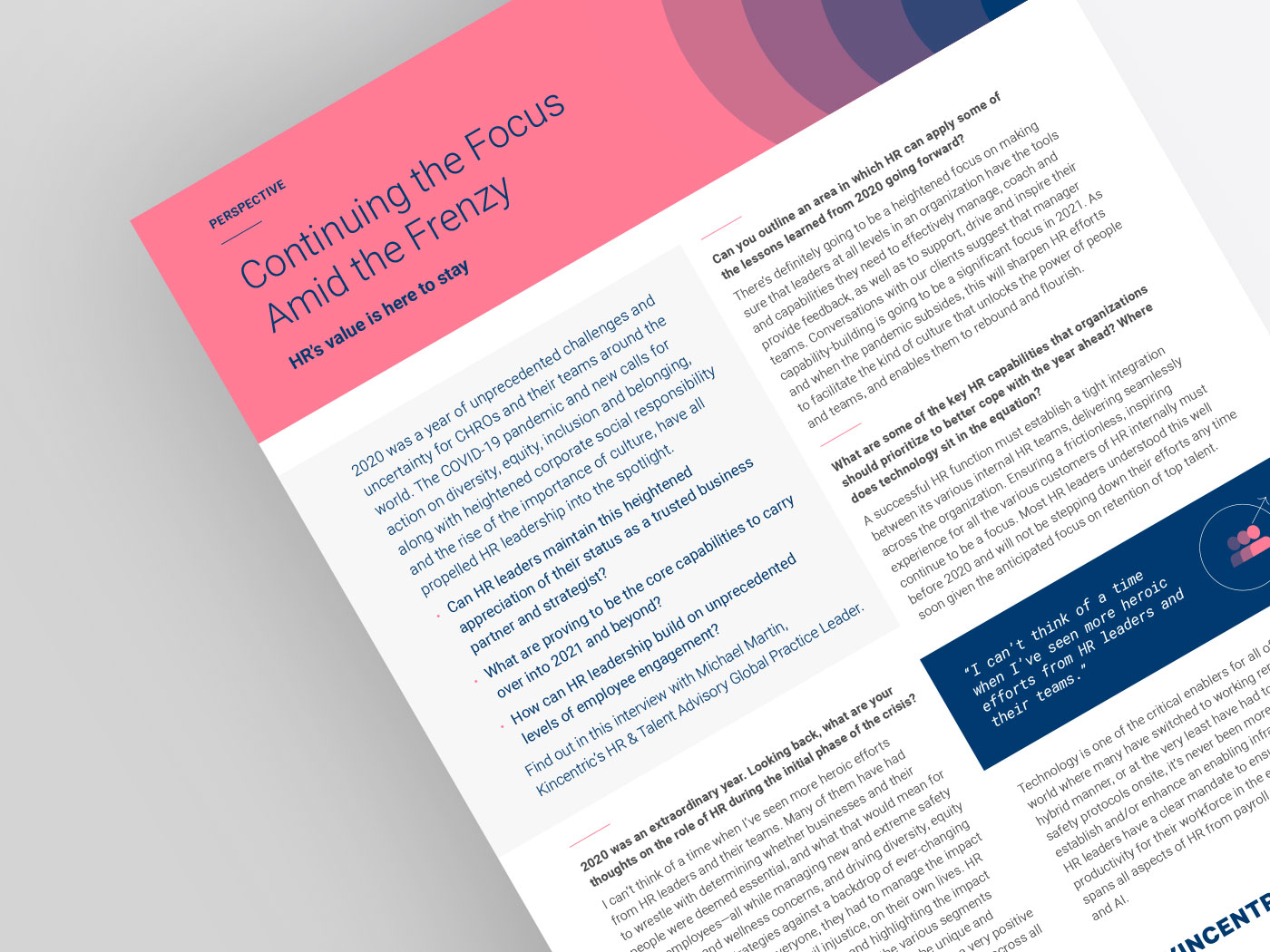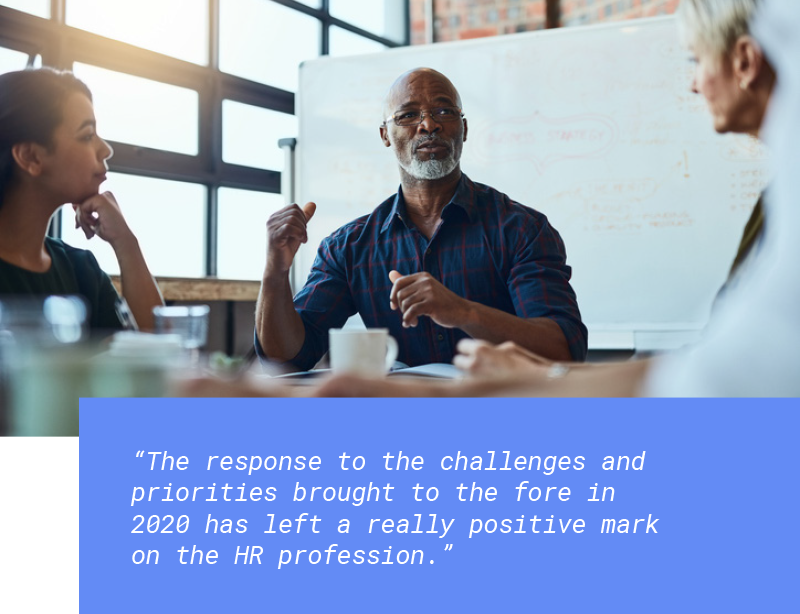
2020 was a year of unprecedented challenges and uncertainty for CHROs and their teams around the world. The COVID-19 pandemic and new calls for action on diversity, equity, inclusion and belonging, along with heightened corporate social responsibility and the rise of the importance of culture, have all propelled HR leadership into the spotlight.
Find out in this interview with Michael Martin,
Kincentric’s HR & Talent Advisory Global Practice Leader.
2020 was an extraordinary year. Looking back, what are your thoughts on the role of HR during the initial phase of the crisis?
I can’t think of a time when I’ve seen more heroic efforts from HR leaders and their teams. Many of them have had to wrestle with determining whether businesses and their people were deemed essential, and what that would mean for their employees—all while managing new and extreme safety measures and wellness concerns, and driving diversity, equity and inclusion strategies against a backdrop of ever-changing unknowns. And, like everyone, they had to manage the impact of the pandemic, and of civil injustice, on their own lives. HR led the charge in understanding and highlighting the impact of the events of 2020 on people and the various segments within each organization. Solutions had to be unique and tailored—not a one-size-fits-all response. It’s left a very positive mark on the minds of leaders, teams and employees across all organizations and on the profession as a whole.
Can you outline an area in which HR can apply some of the lessons learned from 2020 going forward?
There’s definitely going to be a heightened focus on making sure that leaders at all levels in an organization have the tools and capabilities they need to effectively manage, coach and provide feedback, as well as to support, drive and inspire their teams. Conversations with our clients suggest that manager capability-building is going to be a significant focus in 2021. As and when the pandemic subsides, this will sharpen HR efforts to facilitate the kind of culture that unlocks the power of people and teams, and enables them to rebound and flourish.
What are some of the key HR capabilities that organizations should prioritize to better cope with the year ahead? Where does technology sit in the equation?
A successful HR function must establish a tight integration between its various internal HR teams, delivering seamlessly across the organization. Ensuring a frictionless, inspiring experience for all the various customers of HR internally must continue to be a focus. Most HR leaders understood this well before 2020 and will not be stepping down their efforts any time soon given the anticipated focus on retention of top talent.

Technology is one of the critical enablers for all of this—in a world where many have switched to working remotely or in a hybrid manner, or at the very least have had to adapt to new safety protocols onsite, it’s never been more important to establish and/or enhance an enabling infrastructure. Right now HR leaders have a clear mandate to ensure connectedness and productivity for their workforce in the era of hybridity, which spans all aspects of HR from payroll to advanced analytics, RPA and AI.
We’ve talked about essential HR capabilities. What are the critical enablers successful CHROs look for in their hires?
It’s important to make sure you have sophisticated capabilities across your HR team. Work with our clients has revealed that you must not lose sight of the building blocks of “good HR” while focusing on the capabilities needed to truly drive business strategies. “Organizational Advisor” is one critical capability for HR professionals. There are at least five additional capabilities we recommend for HR teams:
Talent Accelerator: From brand-new HR analyst to seasoned HR executive, individuals need the hunger and mindset to drive performance and talent across all segments. A good talent accelerator understands that unlocking the power of people across all teams enables the business. It’s such a meaningful focus that it’s Kincentric’s tagline.
Connector: Driving connection points inside HR and across the organization nourishes the employee eXperience (eX). Connecting all segments in pursuit of a common mission underpins business innovation and profitability and, crucially, thus enhances the employee eXperience.
Storyteller: The HR function must be able to draw compelling conclusions from their organization’s people data—often as a first point of contact—and this demands fluent and creative analytics and storytelling capabilities. Building bonds instills purpose, while marrying data insights with emotional connections fosters the authenticity that nourishes a great culture, eX and organization.
Digital Enabler: Understanding your organization’s digital transformation strategies and their implications on your talent is critical. Digital is more than a technology or efficiency play. Defining digital and its implications in your organization may only be the first step. Culture, mindset shifts, new skills and ways of working are all talent aspects of digital transformation. At a minimum, HR needs to ensure talent strategies are in place to support digital business transformation. Leading by example from the HR team is a better measure of success.
Culture Shaper: Many organizations believe that the responsibility for shaping and driving culture rests with the CHRO. There is no longer permission to not understand and define organizational culture and the levers that need adjusting to activate culture internally. I believe this critical capability manifests itself in many forms, so everyone in HR should have a nuanced awareness of the health of the organization’s culture—especially so after 2020.
How are HR leaders reassessing their own role in the aftermath of the past year?
shows. I predict that in many cases the profile of a redefined HR business partner role will develop into one of a proactive talent and business strategist who sits on the leadership teams of the business units across the organization.
In turn, the role will provide strategic input, helping to achieve successful business outcomes through more closely aligned talent management and acquisition strategies, all with a sharpened focus on diversity, equity and inclusion. They will have a mandate to drive performance through all of their people, and from this vantage point they will bring greater clarity to HR function requirements. However, the unfortunate reality with this focus on the business partner is the need to think holistically across the HR operating model and make big moves to ensure HR business partners have not only the capabilities, but also the capacity needed to focus on strategic imperatives.
Leveraging HR by aligning it with the business model and encouraging strategic input ultimately delivers corporate value. As automation advances at dizzying speed, the CHRO and indeed the function must evolve further into the strategic realm. But organizations must invest in enabling this HR evolution into business, talent and organizational effectiveness strategists.

What’s the willingness for rethinking HR right now?
Our data tells us that many HR leaders were planning to invest in continuing to shore up the function—37% of organizations planned to invest in enabling HR infrastructure after a few months following the pandemic outbreak, and 32% intended to revisit HR capability-building. They’re not necessarily moving to fully transform HR, because most of our clients and most organizations have done that already. It’s more about evolving around the edges where necessary, to sustain the good work that’s already been done.
We saw an incredible rise in employee engagement in the first wave of the pandemic, but engagement fell in the second half of 2020. What can HR do to prevent further decline?
The first step is to make sure that you have measurement strategies, programs, processes and capabilities in place to understand the level of employee engagement in your organization. There’s never been a more important time to be listening to your organization and collecting insights at the right cadence so you are clear where your workforce is in terms of its engagement—and the moments that matter for your talent. I’m not saying “measure more, more and more.” But measure in a way that the organization actually has time to digest and respond to any insights in a meaningful way.
When you turn to how the organization must respond to what engagement insights are telling you, the implications will probably again focus on the role of the leader, manager and front-line supervisor, and ensuring the tools and capabilities to support managers and colleagues are available.
As we move into a new, likely permanent, hybrid workforce, organizations will also need to rethink their people and talent strategies—which should inform plans to sustain positive employee experiences are achieved.
We’re all on a change curve coming out of 2020. Early on, thanks to tremendous responses, people felt closer to their leaders than they ever had before, as HR and their organizations made sure that employees were cared for. As we’ve moved into the throes of the middle/later phase, we have seen engagement starting to drop across our client organizations globally.
Therefore, it’s critical that leaders stay close to the pulse of what’s happening. The aim is to get back to where you were pre-pandemic—with stronger engagement.

You mentioned change, and HR has been both driving and undergoing dramatic levels of change. What’s next—is there an appetite for more change?
There has to be, as change isn’t optional. And it’s not only HR that needs to keep pushing forward, it’s the organization as a whole. I just mentioned employee engagement, and change management is absolutely central to that. But more widely still, HR has a huge contribution to make when it comes to strategizing and shepherding the changes that we’re all experiencing to a positive outcome.
Finally, what long-standing capabilities and approaches proved invaluable in 2020? And what should HR be focused on in 2021?
Agility in HR has never been more critical
The ability to respond rapidly to multiple scenarios with the right team, the right solutions, and decision making where it is most effective, is critical. This should spell the end of the traditional siloed approach in HR, as HR leaders pull people together quickly to respond when needed to the next priority, cutting red tape and clearing out old ways of working.
Keep the focus on the employee
That’s always been part of the job, of course. But the pandemic has emphasized the importance of thinking about employees not as one broad segment in an organization, but as diverse and unique interrelated segments. Be specific, and put the employee at the heart of programs, policies and processes. And be sure to understand the experiences of your diverse workforce across the entire lifecycle of HR programs.
Maintain the wellness momentum
Organizations have an opportunity to raise the bar on supporting employee wellness across multiple dimensions at work and at home. More so than ever, the lines between work and home have blurred or gone away altogether. Redefine wellness with a wide lens. Employees will remember and appreciate how this focus made them feel for years to come. And don’t forget about your own HR team. The heroes in HR deserve a focus on wellness support too.
Prepare your NeXt HR Agenda
The continuing uncertainty coupled with the heightened recognition, appreciation and demand for HR leadership highlights the importance of defining and articulating your HR strategy and creating an agile framework that ensures your teams are focused on the right priorities. CHROs must be prepared to tackle the many big challenges ahead without losing any momentum, while maintaining a focus amid the frenzy.
We would like to thank Michael Martin for contributing his insights to this article.
Want the latest insights delivered straight to your mailbox?